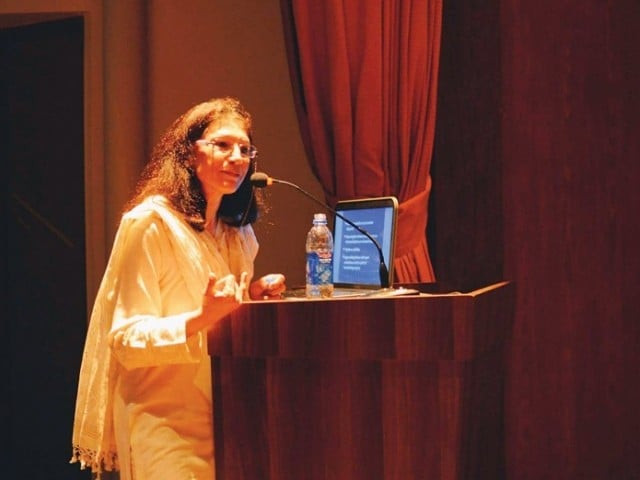Interpreting history: A failed state? Ayesha Jalal doesn’t think so
The historian believes that Pakistanis have lost control of the narrative.

“I stand by my interpretation of Pakistan — my book offers a framework to understand the country’s history,” said Jalal. PHOTO COURTESY: IBA SOCIAL SCIENCES CLUB
Historian Ayesha Jalal doesn’t think Pakistan is an irrelevant country, a mistake or a failed state. And she doesn’t care if you disagree with her.
Jalal discussed her latest book, The Struggle for Pakistan, at the Mohatta Palace on Friday evening, highlighting her key arguments and sharing her insights about the country’s current political situation.
“I stand by my interpretation of Pakistan — my book offers a framework to understand the country’s history,” said Jalal, adding that she hoped her work would be refined by future historians.
Explaining why she felt the need to write the book, she said it was important for a country to have a narrative history. “Pakistanis have lost control of the contemporary narrative at the international level,” Jalal noted. “The notion of Pakistan as a failed state is one that is highly promoted by the Indians.”
She made it clear that her work was not fiction, despite Pakistanis often wanting to exaggerate and fabricate the country’s history. “This is a place that will never give you anything. No one will share their private papers.”
Touching upon Pakistan’s creation, Jalal commented that it was “almost clichéd to say that religion was the main impetus.” And in response to the general view that the death of Mohammad Ali Jinnah is what started the country off on the wrong foot, she pointed out that Gandhi too had died soon after Partition.
Moving on to 1971, she said that in 1968, during a visit to Dhaka, Zulfikar Ali Bhutto had asserted that an autonomous East Pakistan would be best for the country. She added that Bhutto had an independent foreign policy, in which he reaffirmed ties with oil-producing countries and forged closer relations with China.
Jalal mentioned that while 1979 was best remembered for the Soviet invasion of Afghanistan and the Iranian revolution, there were other events — the Iran hostage crisis, the attack on the Grand Mosque in Makkah and the burning of the American embassy in Islamabad — that led to a wave of anti-American sentiment in the Muslim world. She then came forward to more recent matters, such as the 2013 general elections, which, according to her, were as free and fair as Pakistan’s structural and existential realities allowed them to be.
“Free and fair elections will remain an aspiration, not a reality,” Jalal claimed, adding that the turnout was nonetheless most encouraging given that the Tehreek-e-Taliban Pakistan had declared democracy un-Islamic and had targeted three political parties. As for military courts, she dismissed them, saying that she did not believe they could offer a real solution to the problem of terrorism.
Asked if Pakistan could overcome terrorism, Jalal said that it wouldn’t happen in a great hurry.
But she was also cautiously optimistic when questioned about the country’s future when no ethnic group was satisfied with its lot. She believed that at the very least, Pakistan would not be erased from the world map.
Published in The Express Tribune, March 1st, 2015.


















COMMENTS
Comments are moderated and generally will be posted if they are on-topic and not abusive.
For more information, please see our Comments FAQ